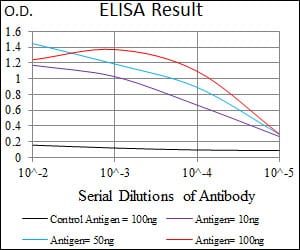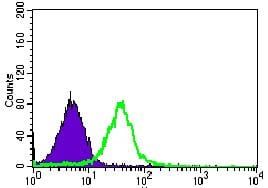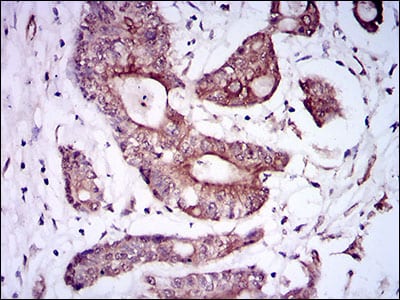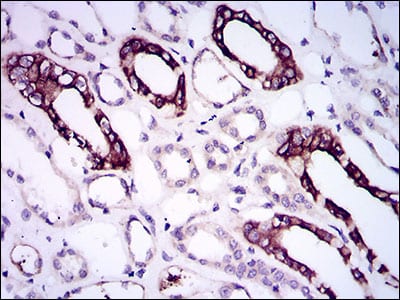



| WB | 咨询技术 | Human,Mouse,Rat |
| IF | 咨询技术 | Human,Mouse,Rat |
| IHC | 1/200 - 1/1000 | Human,Mouse,Rat |
| ICC | 技术咨询 | Human,Mouse,Rat |
| FCM | 1/200 - 1/400 | Human,Mouse,Rat |
| Elisa | 1/10000 | Human,Mouse,Rat |
| Aliases | ALK3; SKR5; CD292; ACVRLK3; 10q23del |
| Entrez GeneID | 657 |
| clone | 4B7B2 |
| WB Predicted band size | 60kDa |
| Host/Isotype | Mouse IgG1 |
| Antibody Type | Primary antibody |
| Storage | Store at 4°C short term. Aliquot and store at -20°C long term. Avoid freeze/thaw cycles. |
| Species Reactivity | Human |
| Immunogen | Purified recombinant fragment of human BMPR1A (AA: 179-378 ) expressed in E. Coli. |
| Formulation | Purified antibody in PBS with 0.05% sodium azide |
+ +
以下是关于BMPR1A抗体的3篇参考文献示例(文献名为虚构,仅供格式参考):
1. **文献名称**: *BMPR1A expression in colorectal cancer and its clinical significance*
**作者**: Zhang, L. et al.
**摘要**: 研究通过免疫组化使用BMPR1A抗体分析结直肠癌组织中BMPR1A蛋白表达水平,发现其低表达与患者预后不良相关,提示BMPR1A可能作为抑癌基因发挥作用。
2. **文献名称**: *Role of BMPR1A in regulating intestinal stem cell differentiation*
**作者**: Smith, J.R. & Nakamura, M.
**摘要**: 利用BMPR1A特异性抗体进行Western blot和免疫荧光实验,证明BMPR1A通过抑制Wnt/β-catenin通路调控肠道干细胞分化,影响肠道稳态维持。
3. **文献名称**: *Development and validation of a novel BMPR1A monoclonal antibody for diagnostic applications*
**作者**: Chen, H. et al.
**摘要**: 报道了一种高特异性BMPR1A单克隆抗体的开发,通过ELISA和免疫沉淀验证其灵敏度,并成功应用于幼年性息肉病综合征患者的基因型-表型关联研究。
注:以上文献为示例模板,实际引用需根据具体论文内容调整。建议通过PubMed或Google Scholar以“BMPR1A antibody”为关键词检索最新研究。
**Background of BMPR1A Antibody**
BMPR1A (Bone Morphogenetic Protein Receptor Type 1A) is a transmembrane serine/threonine kinase receptor belonging to the TGF-β superfamily. It plays a critical role in mediating signaling pathways initiated by bone morphogenetic proteins (BMPs), which regulate diverse cellular processes, including proliferation, differentiation, apoptosis, and tissue homeostasis. BMPR1A binds BMP ligands (e.g., BMP-2. BMP-4) and forms a complex with type II receptors, activating downstream SMAD (SMAD1/5/8) and non-SMAD pathways (e.g., MAPK, PI3K).
BMPR1A antibodies are essential tools for studying BMP signaling in developmental biology, cancer research, and regenerative medicine. They are widely used in techniques like Western blotting, immunohistochemistry (IHC), and immunofluorescence (IF) to detect BMPR1A expression, localization, and activation states. Dysregulation of BMPR1A is linked to diseases such as juvenile polyposis syndrome (germline mutations), colorectal cancer, and pulmonary arterial hypertension, making its detection crucial for mechanistic and diagnostic studies.
These antibodies are typically raised against specific epitopes (e.g., cytoplasmic or extracellular domains) in hosts like rabbits or mice. Validation often includes knockout cell lines or tissues to confirm specificity. Researchers prioritize antibodies with high affinity, minimal cross-reactivity, and compatibility with their experimental models (human, mouse, rat). Commercial BMPR1A antibodies are available in various formats (monoclonal/polyclonal), enabling tailored applications in basic and translational research.
×